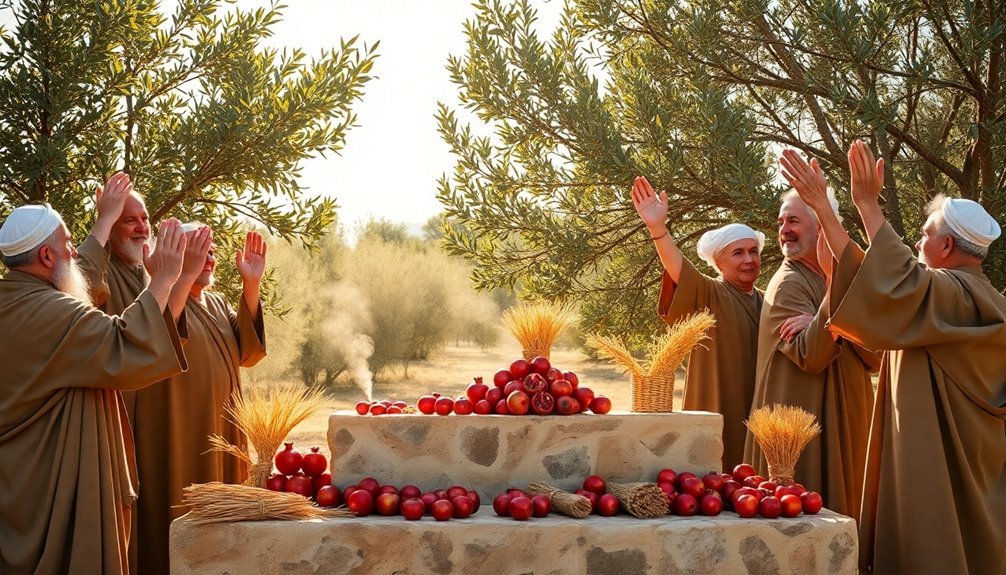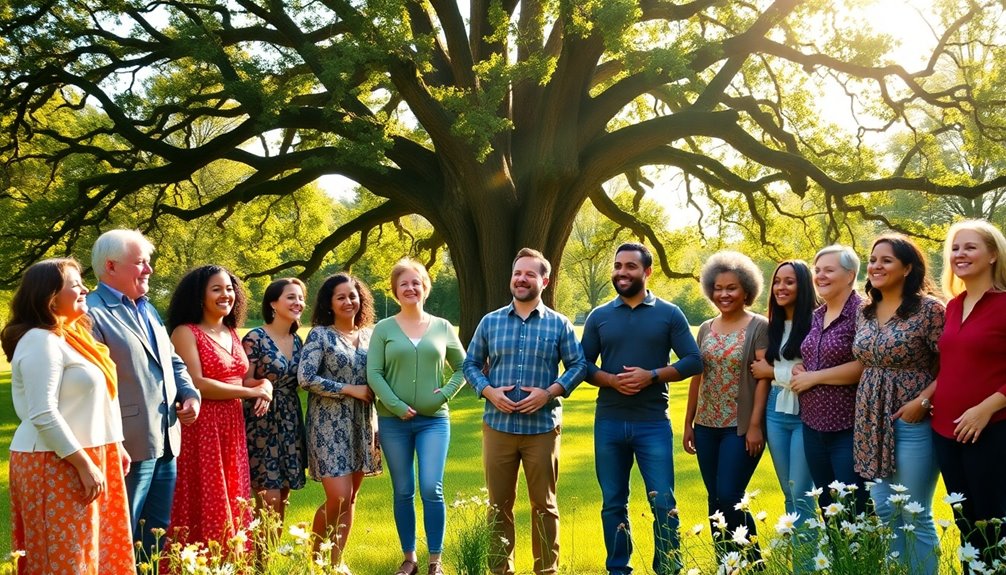Gratitude in the Bible is your acknowledgment of God's goodness and blessings. It reflects a heart aligned with His will, showing obedience and faithfulness. Verses like 1 Thessalonians 5:18 instruct you to give thanks in all circumstances. Through practices like the ancient Hebrew expressions *Todah* and *Yadah*, you're reminded to praise God actively. Cultivating gratitude not only deepens your relationship with Him but also fosters community connections. This biblical principle supports spiritual health and promotes peace in your life. Stick around to uncover more insights and enhance your understanding of gratitude's role in your faith journey.
Key Takeaways
- Gratitude in the Bible acknowledges God's goodness and blessings, reflecting His sovereignty in believers' lives.
- The Hebrew terms *Todah* (praise) and *Yadah* (thanks) highlight gratitude's significance in worship.
- Biblical verses, such as 1 Thessalonians 5:18, emphasize gratitude as a commandment essential for spiritual health.
- Gratitude fosters a deeper relationship with God, aligning believers' hearts with His will and purpose.
- Ancient Jewish practices of thanksgiving, like sacrifices and communal celebrations, illustrate gratitude's cultural and spiritual importance.
Introduction

Gratitude holds a significant place in the Bible, serving as both an acknowledgment of God's goodness and a heartfelt response to His blessings.
You see, la Biblia emphasizes the importance of expressing gratitud through the Hebrew terms Todah and Yadah, which signify praise and thanks. These terms reflect a deeper understanding of how you should respond to Dios's kindness in your vida.
In 1 Thessalonians 5:16-18, you're reminded to give gracias in all circumstances, reinforcing that gratitude isn't just a reaction to good times but a vital aspect of your fe.
The practice of acción de gracias is woven throughout the Psalms, where believers are encouraged to celebrate God's deeds and mercies consistently.
Living a grateful life means you're continually expressing praise for what Dios has done for you. This lifestyle fosters peace and strengthens your relationship with Him.
By cultivating gratitude, you open yourself up to recognizing the blessings around you, even in challenging moments.
Ultimately, gratitude transforms your perspective, allowing you to experience life more fully and with a heart aligned to God's goodness.
Biblical Gratitude Verses

When you explore biblical gratitude verses, you'll find powerful guidance on expressing thankfulness.
Key references like 1 Thessalonians 5:16-18 and Psalm 136:1 highlight how gratitude shapes your relationship with God and enriches your faith.
Let's look at both primary and secondary Bible references that emphasize the importance of gratitude in your spiritual journey.
Primary Bible References
The Bible is filled with verses that highlight the significance of gratitude in a believer's life. In 1 Tesalonicenses 5:16-18, you're reminded to "rejoice always, pray without ceasing, and give thanks en todo," for this is la voluntad de Dios for you. This passage emphasizes how gratitude should be a constant in your life, even en medio de challenges.
Psalm 136:1 encourages you with the words, "Give thanks to the Lord, for He's good; su gran amor endures forever." This verse highlights God's enduring goodness as a foundation for your gratitude.
Furthermore, in Colossians 3:17, you're instructed to do everything in the name of the Lord Jesus, giving thanks to God the Father through Him, reinforcing gratitude as part of your daily actions.
Philippians 4:6 advises that when you present your requests to God, do so with thanksgiving, integrating gratitude into your prayers.
Lastly, Psalm 100:4-5 invites you to "enter His gates with thanksgiving and His courts with praise," establishing that gratitude is essential in your approach to worship.
Alabanza y gratitude nos lead to deeper faith and connection with God.
Secondary Bible References
Building on the primary Bible references that emphasize gratitude, several secondary verses further illuminate its importance in a believer's life. Colossians 3:17 reminds you that every action should be done in the name of the Lord Jesus, giving thanks to Dios the Father through Him. This highlights how gratitude is integral to your daily vida.
In 1 Thessalonians 5:18, you're instructed to give gracias in all circumstances, as this is Dios's voluntad for you in Christ Jesus. This reinforces the idea that gratitude should be a constant aspect of your fe.
Psalm 100:4 invites you to enter God's presence with thanksgiving and praise, showcasing how gratitude connects you to the divine.
Ephesians 5:20 encourages you to always give thanks to Dios the Father for everything, emphasizing a continuous attitude of gratitude in all aspects of life.
Lastly, Philippians 4:6 advises you to present your requests to God with thanksgiving, illustrating how prayer and gratitude are intertwined in your spiritual practice.
Together, these verses create a profound understanding of gratitude's role in your relationship with Dios.
Ancient Jewish Thanksgiving Practices

Frequently, ancient Jewish practices centered around thanksgiving, known as *Todah*, played a vital role in the community's worship. You'd see individuals offering sacrifices, or *ofrendas*, in the temple as a physical manifestation of their gratitude to Dios. These actions often included songs and prayers of alabanza, making the worship experience vibrant and communal.
One notable practice was *Yadah*, which emphasized raising hands in worship, allowing you to express your gratitude physically during gatherings.
The Feast of Tabernacles, or *Sukkot*, became a significant annual celebration where the Israelites expressed thanks for the harvest and God's continuous provisión during their wilderness journey.
As part of public worship, Psalms of Thanksgiving like Psalm 136 were recited, reminding everyone of God's enduring mercy and faithfulness.
This *acción de gracias* wasn't just a ritual; it was an essential part of life, where gratitude deeply rooted in the community's identity and relationship with Dios. Through these practices, you'd witness how gratitude shaped their worship and reinforced their connection to God and one another.
Cultural Significance of Gratitude

Gratitude holds a profound cultural significance in biblical contexts, weaving together communal worship and personal reflection. In biblical culture, you express gratitude not just as a private emotion but as a communal act. The Hebrew terms "Todah" and "Yadah" highlight the importance of acknowledging God's blessings through active participation in worship.
When you gather during Jewish festivals, the community publicly gives thanks por el favor de Dios, reinforcing bonds and shared faith.
In the New Testament, gratitude becomes a vital response to God's grace, shaping early Christian practices. You see that ser agradecidos influences communal identity, where shared acts of thankfulness strengthen the fabric of your community.
However, modern influences can overshadow this biblical teaching, often leading to a sense of entitlement. That's why it's essential to consciously cultivate thankfulness.
La vida is filled with opportunities to express gratitude, and dice la Biblia acerca de dar gracias en todo. By embracing this practice, you connect more deeply with your faith and community, recognizing the blessings that surround you.
Ultimately, gratitude helps you foster a sense of belonging and appreciation for the divine gifts in your life.
Gratitude as a Commandment

You might think gratitude is just a nice sentiment, but the Bible actually commands it as a vital part of your faith.
Understanding its true purpose helps you see that gratitude isn't just about feeling thankful; it's an essential response to God's goodness.
Let's explore some common misconceptions and clarify why gratitude is more than a mere suggestion in scripture.
Debunking Common Misconceptions
Many believers misunderstand gratitude as a mere suggestion rather than a divine commandment. In reality, gratitude is deeply rooted in scripture as a vital part of our relationship with Dios. For instance, 1 Thessalonians 5:18 explicitly instructs us to "give thanks in all circumstances," highlighting that this act is part of la voluntad de Dios for our lives.
Additionally, Colossians 3:17 emphasizes that our actions should be rooted in gratitude, reinforcing that it isn't just a ritual but a crucial expression of faith. When you offer acción de gracias, you fulfill your vows to God, as Psalm 50:14 illustrates, showing that gratitude is linked to obedience and faithfulness.
Jesus modeled this attitude during his prayers, demonstrating that thankfulness is integral to how you connect with God.
Misunderstanding Gratitude's Purpose
Recognizing gratitude as a commandment rather than a mere suggestion shifts how it's perceived and practiced in the life of a believer. In 1 Thessalonians 5:18, you're instructed to give thanks in all circumstances, affirming that ser agradecidos isn't optional but essential.
La Gratitud en nuestra vida is a vital expression of worship, reflecting your acknowledgment of Dios por Su sovereignty and goodness.
When you embrace gratitude as a commandment, it fosters a heart aligned with la voluntad de Dios. This practice guards against the peril of ingratitude highlighted in 2 Timothy 3:2, reminding you that una falta de la alabanza can lead to spiritual decline.
Instead, gratitude enhances your spiritual health and deepens your relationship with God.
In Colossians 3:17, you're encouraged to do everything in the name of the Lord Jesus, giving thanks to God the Father. This directive shows that gratitude isn't just an act; it's a way of life for every believer.
Daily Gratitude Journaling

Daily gratitude journaling can transform how you interact with others, encouraging you to express appreciation in your daily life.
By recognizing what you're thankful for, you'll enhance your relationships and inspire group gratitude activities that foster community.
This practice not only deepens your connection to those around you but also aligns with biblical teachings on thankfulness.
Gratitude in Daily Interactions
A gratitude journal can transform your daily interactions by encouraging you to focus on the blessings and positive experiences that often go unnoticed. When you take the time to write down what you're thankful for, you align your thoughts with God's goodness in your vida. It's an intentional action that helps you recognize the small acts of kindness from others, reinforcing your sense of connection.
By documenting specific moments where you felt appreciated, you not only cultivate gratitud but also strengthen your relationships. You'll find yourself being more aware of how others contribute to your happiness, making it easier to express gracias for their support. This practice fosters resilience during challenging times, reminding you of the positive aspects of your life.
Moreover, reflecting on your daily interactions through gratitude can deepen your spiritual connection. You begin to see how God is present in both joyful and difficult moments.
As you make it a habit to be agradecidos each day, you'll notice a shift in your mindset, allowing you to embrace life with a sense of peace and joy. Remember, gratitude is more than just a feeling; it's a powerful action that transforms your relationships.
Group Gratitude Activities
Engaging in group gratitude activities can amplify the benefits of individual gratitude journaling. When you share what you're thankful for, you deepen your awareness of blessings and foster a supportive environment.
By writing down at least three things each day, you not only cultivate una vida de thankfulness but also encourage others to reflect on God's goodness.
As you come together as a group, you develop an actitud de gratitude that strengthens community bonds. You might find yourselves expressing thanks for the small joys and significant blessings alike, recognizing, gracias al, the faithfulness of Dios y su provisions in your lives.
This collective practice can help reduce stress and build resilience during tough times, allowing you to support one another.
Moreover, sharing your gratitude journals can inspire deeper conversations about life and faith. You'll find that you become más agradecidos por the everyday miracles that often go unnoticed.
Ultimately, these activities serve as a powerful reminder of 1 Thessalonians 5:16-18, encouraging you to give thanks en el nombre del Señor, para que your hearts align more closely with biblical teachings on gratitude.
Embrace this journey together!
Gratitude Fosters Community Connections

Gratitude creates powerful community connections that enhance our sense of belonging. When you practice gratitud por las bendiciones en tu vida, you foster deeper relationships with those around you. Shared expressions of thankfulness during gatherings, like church services, create an uplifting atmosphere where everyone can connect over common experiences. This acción de gracias encourages others to reflect on their blessings, promoting a culture of appreciation and support.
Being parte de una comunidad donde la voluntad de Dios para ser agradecidos es evidente strengthens emotional bonds. When you share personal testimonies of gratitude, you inspire los que te rodean to embrace a similar attitude. This shared value of gratitude not only uplifts individuals but also unites the community.
Moreover, engaging in community service projects rooted in gratitude reinforces the idea that serving others is a natural extension of being thankful for one's own blessings.
This wonderful de la voluntad de Dios para ser agradecidos fosters a cohesive environment where everyone feels valued. By prioritizing gratitude, you contribute to a vibrant, supportive community that thrives on connection and mutual respect.
Additional Resources

Numerous resources can enhance your understanding and practice of gratitude in everyday life. One valuable tool is a gratitude journal, where you can regularly jot down your "gracias" to Dios for the blessings in your vida. This simple práctica helps you recognize God's goodness and reinforces the action of thanksgiving.
You might also consider engaging in community sharing of thankfulness. Gathering with others to express gratitude not only strengthens bonds but also reflects the voluntad de Dios in fostering unity.
Additionally, scriptural meditation on verses like 1 Thessalonians 5:18 can deepen your awareness of gratitude. This passage encourages you to give thanks in all circumstances, reminding you that gratitude is integral to a faithful life.
Exploring the Hebrew terms "Todah" and "Yadah" can further enrich your understanding of gratitude's biblical significance, encompassing praise and an active response to divine blessings.
Lastly, participating in Communion, or the Eucharist, can be a profound reminder of God's favor and grace, reinforcing the importance of gratitude in your journey of faith. Engaging in practices that promote self-reflection can also enhance your capacity for gratitude and overall mental well-being.
Embrace these resources to cultivate a life filled with gratitude.
Frequently Asked Questions
What Does the Word Gratitude Mean in the Bible?
When you think about gratitude in the Bible, you see it as a deep expression of thanks and praise.
It's not just about saying "thank you" but recognizing the blessings in your life. You're encouraged to maintain a thankful heart in all circumstances.
This attitude fosters a closer relationship with God and builds community. By embracing gratitude, you acknowledge God's goodness and respond with joy and appreciation every day.
What Does Jesus Say About Gratitude?
Jesus emphasizes gratitude as a crucial response to God's blessings. When He healed ten lepers, only one returned to thank Him, illustrating that recognizing God's gifts is vital.
Before sharing loaves and fishes, He gave thanks, showing gratitude should come before acts of service.
During the Last Supper, His thanks highlighted worship's importance.
What Does It Mean to Have Gratitude to God?
Having gratitude to God means recognizing and appreciating the blessings and goodness in your life.
It's about acknowledging His presence in both good times and bad. When you express thanks, you shift your focus from worries to His faithfulness, fostering a deeper connection with Him.
Practicing gratitude also helps you cultivate joy and peace, reminding you that even in struggles, there's always something to be thankful for.
Embrace this mindset daily!
What Does Gratitude Mean in the Spiritual Sense?
Gratitude in the spiritual sense means recognizing and appreciating the good in your life, especially during challenging times.
It's about acknowledging the blessings you receive, fostering a deeper connection with your beliefs.
When you practice gratitude, you shift your focus from what you lack to what you have, nurturing a mindset of abundance.
This practice not only enhances your spiritual journey but also transforms your perspective, helping you find joy and peace in every moment.










